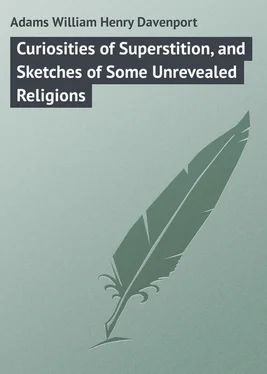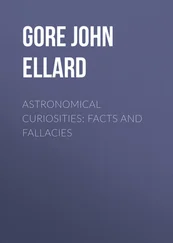William Adams - Curiosities of Superstition, and Sketches of Some Unrevealed Religions
Здесь есть возможность читать онлайн «William Adams - Curiosities of Superstition, and Sketches of Some Unrevealed Religions» — ознакомительный отрывок электронной книги совершенно бесплатно, а после прочтения отрывка купить полную версию. В некоторых случаях можно слушать аудио, скачать через торрент в формате fb2 и присутствует краткое содержание. Жанр: foreign_language, foreign_prose, на английском языке. Описание произведения, (предисловие) а так же отзывы посетителей доступны на портале библиотеки ЛибКат.
- Название:Curiosities of Superstition, and Sketches of Some Unrevealed Religions
- Автор:
- Жанр:
- Год:неизвестен
- ISBN:нет данных
- Рейтинг книги:4 / 5. Голосов: 1
-
Избранное:Добавить в избранное
- Отзывы:
-
Ваша оценка:
- 80
- 1
- 2
- 3
- 4
- 5
Curiosities of Superstition, and Sketches of Some Unrevealed Religions: краткое содержание, описание и аннотация
Предлагаем к чтению аннотацию, описание, краткое содержание или предисловие (зависит от того, что написал сам автор книги «Curiosities of Superstition, and Sketches of Some Unrevealed Religions»). Если вы не нашли необходимую информацию о книге — напишите в комментариях, мы постараемся отыскать её.
Curiosities of Superstition, and Sketches of Some Unrevealed Religions — читать онлайн ознакомительный отрывок
Ниже представлен текст книги, разбитый по страницам. Система сохранения места последней прочитанной страницы, позволяет с удобством читать онлайн бесплатно книгу «Curiosities of Superstition, and Sketches of Some Unrevealed Religions», без необходимости каждый раз заново искать на чём Вы остановились. Поставьте закладку, и сможете в любой момент перейти на страницу, на которой закончили чтение.
Интервал:
Закладка:
Prayer, according to Zarathustra, is not the humbling of the soul before its Creator, not the aspirations of the spirit towards the Source of all Love and Mercy, not the desire of the creature to be at peace with God, but the renunciation of will, – a noble and worthy aim in itself, but not fulfilling the Christian idea of prayer. To do good and to shun evil is, no doubt, the motive of the Christian life; but prayer is something more and something higher, the sacrifice of an humble and a contrite heart.
“Heaven is the magazine wherein God puts
Both good and evil; prayer’s the key that shuts
And opens this great treasure; ’tis a key
Whose wards are Faith, and Hope, and Charity.
Wouldst thou prevent a judgment due to sin?
Turn but the key and thou mayst lock it in.
Or wouldst thou have a blessing fall upon thee!
Open the door and it will shower on thee.” 21 21 Quarles.
But no such conception as this is discernible throughout the length and breadth of the Parsee Scriptures, which here, as elsewhere, and in relation to other matters, attain a lofty, but not the loftiest, level; rise above earth, but do not soar to Heaven. They seem instinct with echoes of the original revelation vouchsafed to man, but those echoes are faint and imperfect; whereas, in the Hebrew creed, the voices of God are repeated with a fulness and a power which leaves the heart nothing to desire. In this vast superiority we cannot fail to see a strong and striking proof of its authenticity. If it be found difficult to account for the moral excellence and æsthetic beauty of Zarathustrianism without tracing it back in some indirect way to a Divine origin; how shall we explain the sublimity and grandeur of the Hebrew Theism, unless we admit that it is all it professes to be, – is, in very truth, the expression of the will of the everliving God?
We have spoken of Zarathustra’s religion as originally monotheistic; its purity, however, was not long preserved, and the cause of its corruption lay in itself. Zarathustra could not deny the existence of Evil, and to explain it was driven to concoct an extraordinary hypothesis. As in every electrified object there are two poles, a positive and a negative, so, according to the Prophet, in Ahura-Mazda, and in all rational beings, man included, are present a good and holy Will, and its shadow or negative, – a higher and a lower nature, – the Positive and the Negative Mind. How Zarathustra reconciled this idea with his conception of Ahura-Mazda, as Perfect Goodness, we are unable to comprehend. At all events, it contained the germs of the future Dualism of the Persian religion. The Negative Mind soon came to be separated from the good and holy Will, and was quickly personified as an independent evil being, a Power of Night and Darkness, Ahriman (Angro-Manyus,) equal in might to Ahura-Mazda, and disputing with him the possession of the world. Thus arose the myth of the constant struggle between the two powers, as between Day and Night; the servants of Ahura-Mazda being sent forth to encounter, resist, and overcome the slaves and works of Ahriman, thereby bringing about the end of all things, when Ahriman himself should be vanquished and reconciled.
In course of time the difficulties of this dual theory were detected by acute intellects, and at the Sassanian Revival an attempt was made to dispose of them by introducing the doctrine of Monotheism under a new form, that of a Great Primal Cause (Zervana Akarana), the Boundless Time or Uncreated Whole, such as we trace in the later Greek poetry, and apparently rather a “metaphysical abstraction,” like the Greek Ἀνάγκη, or the Roman Nemesis, than “an active and presiding deity.” Thence proceeded both the Good and the Evil Principles; the two antagonist creators who balanced against each other in perpetual conflict a race of spiritual and material beings, light and darkness, good and evil. The wise benevolence of Ahura-Mazda formed men capable of virtuous impulses, and endowed each with everything that could contribute to his happiness. He preserved by his watchful providence the harmonious movements of the planets, and the temperate combination of the elements. But the malice of Ahriman has long since pierced Ahura-Mazda’s “egg;” in other words, violated the sweet accord and bounteous beauty of His works. Since that fatal irruption, the most minute articles of good and evil are alternately commingled and agitated together; the most poisonous herbs spring up among the most wholesome plants; the warfare of deluges, earthquakes, and conflagrations disturbs the serenity of nature; and humanity is subjected to all the blighting influences of sin, suffering, and sorrow. While the rest of mankind were led away captive in the chains of their terrible enemy, the faithful Persian alone remained constant in his faith in Ahura-Mazda, and fought under his banner of light, looking forward to a triumphant day when Good should prevail over all the world.
It seems to us impossible to doubt that, in this later development of the Zoroastrian faith, its priests and teachers were largely indebted to the Sacred Writings, though into what they borrowed they introduced much original and fanciful speculation.
A Parsee, with a firm faith in Ahura-Mazda, and conscious of having obeyed the law, offered up prayer and praise, and renounced, in intention at least, evil thoughts and deeds and words, lay down on his death bed in a certain hope and expectation of the Eternal life. We have seen that the Zendavesta appointed a variety of penances, by the performance of which the believer obtained immediate pardon for ordinary transgressions; and therefore, full of the self-righteousness which his creed was so well adapted to inculcate, he faced the passage of the Dark River without fear. He knew not of any need to implore the mercy of a Redeemer, to humble himself in sackcloth and ashes, to base his hope on the infinite love of God made man, on the glorious sacrifice of the Cross; his soul passed straight to Paradise, as an arrow flies towards its mark. In the Khordah Avesta we can follow the stages of its journey: – On the first night after death the soul dwelt near the head of the inanimate body it had just deserted, and sat there praying, rejoicing in as much joy as is vouchsafed to the whole living world. And so did it dwell on the second night, praying. And so did it dwell on the third night, praying. But when the third night verged upon dawn, the soul of the pure man went forward. A wind, sweeter than all other winds, blew to meet it from the south. And in that wind came to embrace the pilgrim his own law , under the figure of a maiden beautiful and shining, fair as the fairest of created beings. The pilgrim then took the first step in his celestial progress, and arrived in the paradise Hamata ; he took the second, and reached the paradise Hûkhta ; he took the third, and arrived at the paradise Hvarsta . The beatified wanderer made yet another step, and gained the presence of the Eternal Light. There was he addressed by an already beatified soul: “How art thou, O pure deceased, who hast come from the perishable world hither to the imperishable?” Ahura-Mazda here interrupted: “Ask him not, for he has come on the fearful trembling way, the separation of soul and body. Bring him hither of the food of the full fatness, that is, of the filling food for those who think, speak, and do good, for the pure after death.”
A recent writer says of this notion of a progressive advance to the “Eternal Light,” of the welcome received from the blessed, and from the gentle words of Ahura-Mazda himself; and of the conducting angel who represents the man’s own earthly faith and life, (like Bunyan’s Mr. Good-Conscience meeting old Honest beside the River of Death,) “all these,” he says, “are beautiful thoughts.” Surely fanciful, rather than beautiful; and better adapted to amuse religious sentimentalists than to satisfy healthy and earnest believers. The obvious reference to the three days and nights spent by our Lord “in prison” appears to indicate that this is a comparatively modern portion of the Zendavesta, founded upon some vague knowledge of the mystery of the Resurrection.
Читать дальшеИнтервал:
Закладка:
Похожие книги на «Curiosities of Superstition, and Sketches of Some Unrevealed Religions»
Представляем Вашему вниманию похожие книги на «Curiosities of Superstition, and Sketches of Some Unrevealed Religions» списком для выбора. Мы отобрали схожую по названию и смыслу литературу в надежде предоставить читателям больше вариантов отыскать новые, интересные, ещё непрочитанные произведения.
Обсуждение, отзывы о книге «Curiosities of Superstition, and Sketches of Some Unrevealed Religions» и просто собственные мнения читателей. Оставьте ваши комментарии, напишите, что Вы думаете о произведении, его смысле или главных героях. Укажите что конкретно понравилось, а что нет, и почему Вы так считаете.












